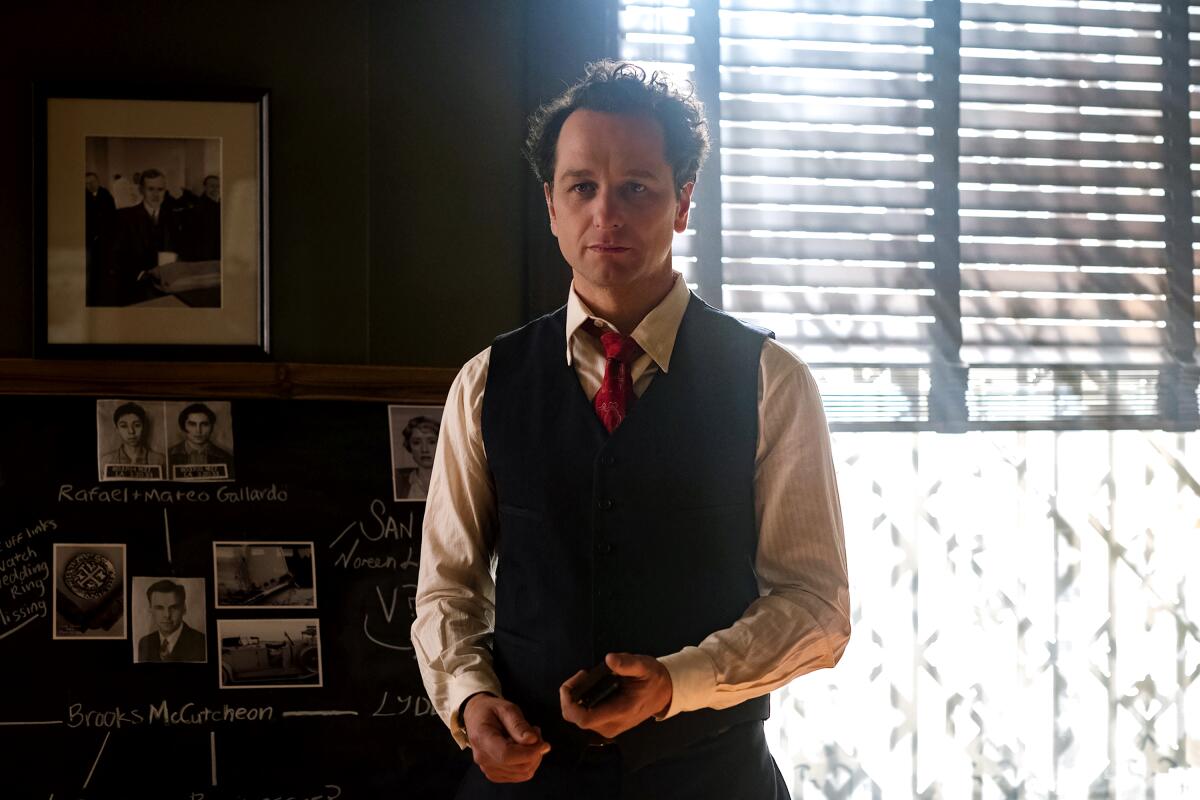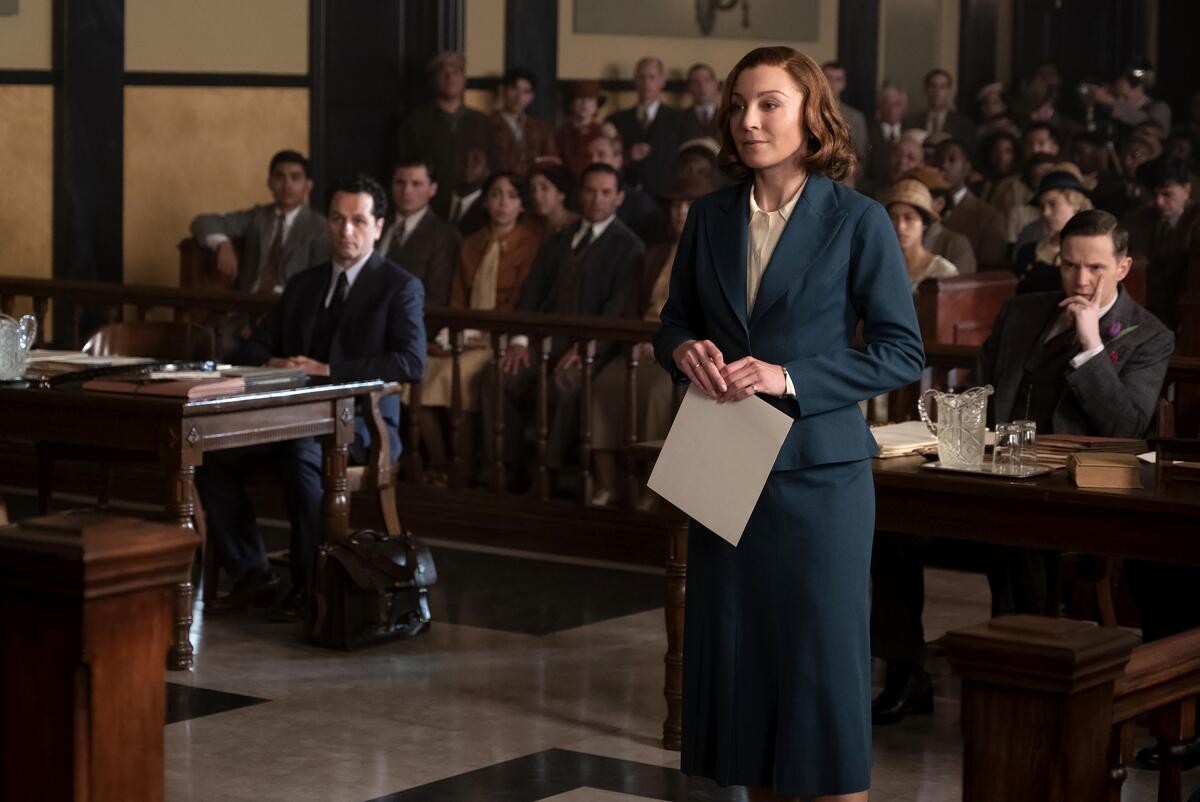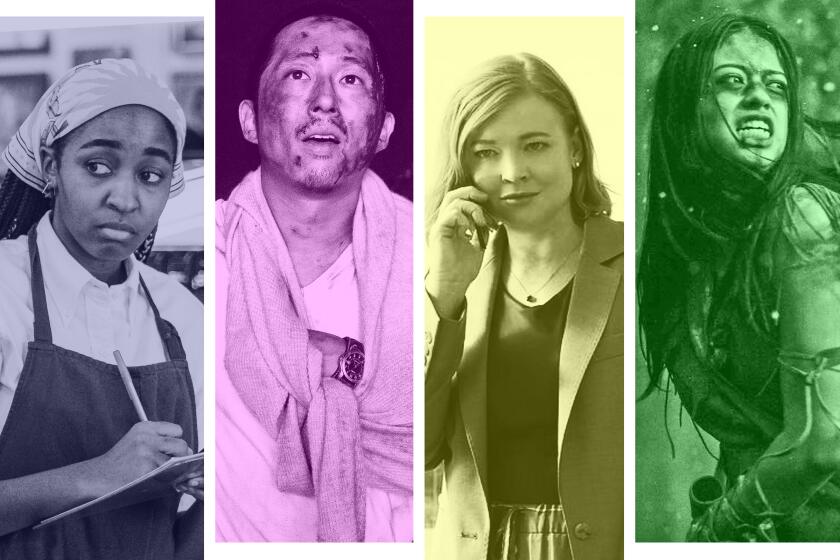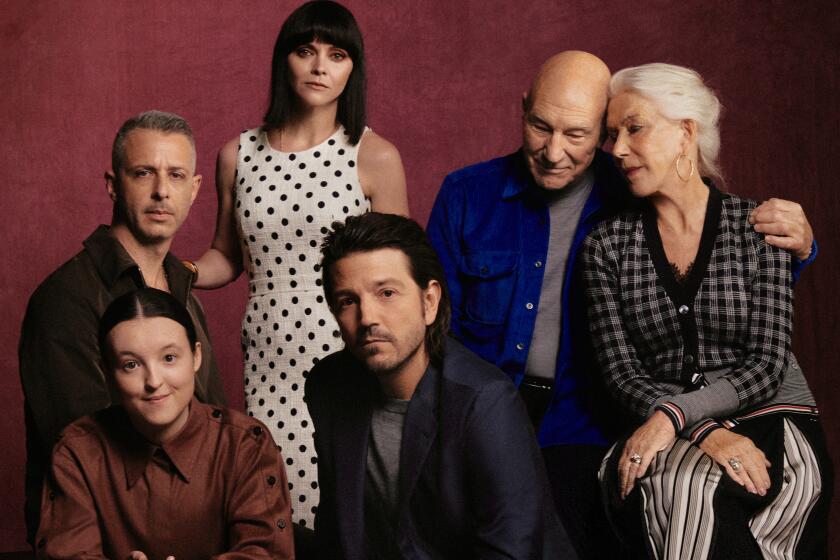How ‘Perry Mason’s’ L.A.-noir makeover in Season 2 stayed true to its roots

- Share via
Matthew Rhys had reservations about a second season of “Perry Mason,” HBO’s take on author Erle Stanley Gardner’s iconic attorney, now a PTSD-suffering noir antihero in Depression-era Los Angeles.
“My greatest fear was we’d pick up as ‘Charlie’s Angels,’ you know what I mean? We had that ending of Season 1, we’re all in the office, feeling great,” he said, briefly sounding out the kind of jaunty series theme an old show might have. “And I love that we’ve picked up and it’s gone to s—, and we’re questioning the whole judicial system.”
The “Perry Mason” that premiered three years ago was envisioned as a limited-series origin story about how a bitter war veteran became a crusading defense lawyer, but also — in a clever dimensionalizing of the crime-solving team Gardner created — how a whip-smart, closeted secretary establishes a legal career (Juliet Rylance’s Della Street) and how a Black beat cop navigates a stacked-deck world to become a prized investigator (Chris Chalk’s Paul Drake).
This time around, an abiding grimness may have subsided, but Rhys was glad that Mason stayed broken as a new murder case challenged everything he believes.
“You had that accelerated momentum of him becoming an attorney, and what I love in Season 2 is the brakes are put on, and he’s not sure whether he can do it,” said Rhys, who earned an Emmy nomination for the first season. “They keep him turbulent, always in great conflict with any number of elements in his life, and that’s great to play.”
Our BuzzMeter panel of veteran TV journalists predicts the winners in 14 categories of the 2023(?) Emmys. You can, too, in our weekly polls.
Finding that balance in Season 2 between noir-ish complexity and a transporting crime story, between what Perry Mason fans want and what prestige-TV viewers demand, fell on Michael Begler and Jack Amiel (“The Knick”), who took over showrunner duties from the departing Rolin Jones and Ron Fitzgerald.
“A great base layer was put down, and it gave us this space to dig deeper, not only into who these people are, but also, what is Los Angeles about?” said Begler, who, with original executive producers Susan Downey and Robert Downey Jr., believed that more sunlight didn’t have to mean less noir. “The first season, as much as I love it, is pretty downtown, gritty and claustrophobic. We wanted to open that up, expand Los Angeles out.”
Moving from the mansions of the wealthy to socioeconomically strapped neighborhoods of color, a haves-and-have-nots story evolved about two young Chicano men charged with killing an oil scion that, to Susan Downey’s thinking, stayed true to her husband’s original idea for “Perry Mason” when the project first gestated.
“He wanted to look at Los Angeles through the point of view of people who felt that they were outsiders,” she said. “They’re not establishment. They’re going to take on the establishment, but each in their own way.”

After learning that only 3% of lawyers were women in 1933, Rylance was eager to argue for a scene where Della — a supportive sidekick in the books — gets to question a witness in court. “It really felt important for Della and Perry to get to a place where he trusts her enough to let her lead at some point,” said Rylance, who got that shot this season. “It’s important to see her progression as a lawyer. Because how big a thing was that, right?”
She also credits the vintage clothing that costume designer Catherine Adair re-created so Rylance could feel like a working woman in a power outfit. “It makes you feel like you’re inhabiting the world in a way that feels organic,” said Rylance. “You look at those movies with Katharine Hepburn or ‘His Girl Friday,’ and think, ‘How do those women use clothes to further themselves, to be acceptable in a man’s environment?’”
In her personal life, though, Della isn’t so put-together, sacrificing her hidden relationship with a woman to explore a new lesbian romance with a boldly sexy, bohemian screenwriter (Jen Tullock). Rylance loved getting to show an ultra-competent woman’s messier private side. “It’s almost like she doesn’t know what any of it really means, she’s so focused on her professional life,” she said.
“Juliet brings that wonderful confidence on the surface but fragility underneath that makes you lean in and really care,” added Susan Downey.
For Rhys, his already well-battered character got a new weak spot too — ironically enough, being a trial lawyer. The situation suggested leaving the actor’s prep behind. “You’re genuinely learning at the same time as the character so those initial courtroom scenes shouldn’t be polished,” said Rhys. “A lot of that fumbling wasn’t just Mason, it was me finding my feet, going, ‘Where would I stand? What would I do with my hands?’ What a gift to be doing the training in real time on screen.”
In a roundtable conversation, Diego Luna, Helen Mirren, Bella Ramsey, Christina Ricci, Patrick Stewart and Jeremy Strong dive deep into their appreciation of writers, mothers and “not giving a f--”
Begler said Rhys’ ability to switch from vulnerable to fierce is “pretty amazing,” pinpointing the star’s eyes as essential to his performance. “He’s so expressive, the guy can do so much with his face. He could almost be a silent actor.”
Of course, it’s not staying silent in the quest for justice — even when it seems impossible — that drives this “Perry Mason,” and it’s why Rhys is excited to keep doing it. “It just burns in him,” said Rhys of his character’s war-forged mentality. “He’s been in the storm when he knew no one was coming. And if no one is coming, Mason says, ‘I have to be the guy, I will come.’ And I love that.”
More to Read
From the Oscars to the Emmys.
Get the Envelope newsletter for exclusive awards season coverage, behind-the-scenes stories from the Envelope podcast and columnist Glenn Whipp’s must-read analysis.
You may occasionally receive promotional content from the Los Angeles Times.










